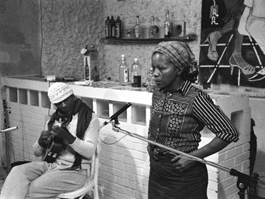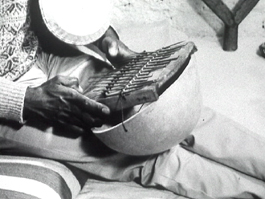|
Sacy Perere ist eine Gruppe
brasilianischer Musiker, die sich in der Emigration, in Paris
begegnet sind. Ihren Namen hat die Gruppe von einer mythischen
Gestalt aus der Kolonialgeschichte Brasiliens übernommen:
Sacy Perere wurde wie andere Sklaven aus Afrika nach Brasilien
verschleppt; wegen einer Bestrafung, die sein Herr mit ihm
vorgenommen hatte, verlor er ein Bein. Seither ist Sacy der
Geist, der den umherirrenden Reisenden mit seiner in das Ohr
geflüsterten Geschichte leitet; das Symbol einer mündlichen
Überlieferung, in der die Musik das unverzichtbare Medium
für das Fortbestehen der schwarzen Völker, ihrer Kultur, ihrer
Werte, ihres Lebens ist.
Der Film verfolgt die Arbeit der fünf Musiker - vier Instrumentalisten
und eine Sängerin - über mehrere Tage hinweg bei Proben und
Gesprächen. Im Mittelpunkt steht dabei die Auseinandersetzung
mit der Tradition brasilianischer Musik im Samba, dessen Wurzeln
in der afrikanischen Musik und den vielfältigen Formen, in
denen sich eine Geschichte der schwarzen Musik Brasiliens
wiederfinden lässt.

Die Improvisation ist für die Gruppe das entscheidende Element,
um traditionelle und moderne musikalische Entwicklungen miteinander
zu verbinden; dabei dringt die Musik bis in den Improvisationsraum
des modernen Jazz vor. Wenn Sacy Perere seine Musik 'zeitgenössische
brasilianische Musik' nennt, so geht es dabei um das grosse
Erbe brasilianischer Traditionen, aber auch um die Erfahrungen
des Blues, des Jazz, der musikalischen Einflüsse der Emigration.
"Der Ton verbindet den Menschen mit unsichtbaren Energien.
Die Afrikaner kennen diese Mysterien; sie besitzen diese Wissenschaft,
die mit Verachtung als 'primitiv' bezeichnet wird."
Die Suche nach einem neuen Ausdruck ist immer auch eine Untersuchung
der eigenen Geschichte; ein neues Element im Vergleich zu
den industrialisierten Elementen der Musik von heute. Sacy
Perere ist ein Film über die Entstehung von Musik.

"Wir alle haben Brasilien aus persönlichen Gründen verlassen,
aber vor allem, um uns der sozialen und kulturellen Kontrolle,
der Zensur, zu entziehen. Wir sind vor der Vernichtung, die
im Unbewussten durch den Katholizismus, die Europäisierung,
den Mangel an Schulen vollzogen wird, geflohen. Schwarz sein
ist schmutzig; es ist notwendig, daß man die "weisse" Seele
hat... Unsere Lebensweise wurde umgewandelt, und wir versuchen
über die Musik zu uns selbst zurückzufinden. Die Musik ist
eine Untersuchung über uns selbst."
Gruppe Sacy Perere
|
Credits
| Director |
|
Rolf Coulanges
|
| Cinematographer |
|
Rolf Coulanges bvk |
| Interviews & Sound |
|
Ursula Dieterich |
Music
Sacy Perere - Dulcinea, Alfredo, Sorriso, Dousty,
Zé Mané
Original version
Portuguese/French with French subtitles
& text
English Version
Portugiesisch/Französisch with English subtiles
& text
Deutsche Fassung
Portugiesisch/Französisch mit deutschem Text
Awards
"Outstanding Film of the Year" London Film Festival
1985
Production
amber film Berlin
Distribution
amber film Berlin
Available as
| 16mm |
|
Original Version |
| 16mm |
|
English Version |
| DVD |
|
Original Version |
| DVD |
|
Deutsche Version |
© amber film Berlin, 1984
|
|